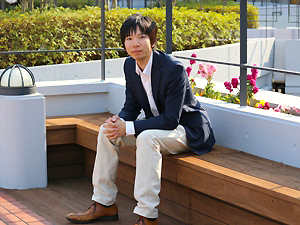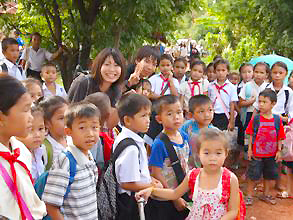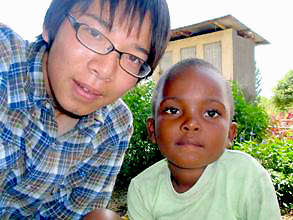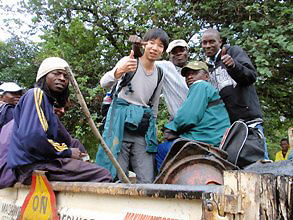2016.05.02
Making full use of everything: my research at the seminar and work experience. To the field of international cooperation

- Masayoshi Asaba
- Japan Overseas Cooperation Volunteers, Community Development
Graduated from the Faculty of Economics in 2012
“I was not interested in international cooperation or global issues until my fourth year at university,”
he said with a smile.
The turning point came when he traveled alone to an African orphanage during the final break of his fourth year.
“I would dedicate my life to these children.”
He was subject to shock and found his purpose in life here, and decided to leave a leading manufacturer where he worked.
This summer, he is leaving for Africa again as a member of the Japan Overseas Cooperation Volunteers (JOCV).
Work for Megmilk Snow Brand. “Trust” which I valued to improve sales performance
“If we could expand products for developing countries...” With this in mind, I joined Megmilk Snow Brand in 2012. I was hoping for a position related to overseas business, but the basic step for new employees was to gain experience in Japan first. In my case, I started in a sales position in Sendai. I honestly enjoyed my job.
Through dealing with retail stores to purchase our products, I learned cooperation and negotiation skills. What I kept in mind was to build trust. No matter how much you promote your product, saying, “This is a great product, please buy it,” if people think “I can’t trust this person,” they won’t do business with you. In any situation, it is important to get to know each other. The other thing is to try different sales approaches from other companies’ sales representatives. I was good at organizing data, so I advised retail stores of sales trends and improvements points using graphs of purchasing statistics, as well as I helped buyers with any problems they had.
I was not the type of person who promotes products actively, but I feel that my attitude toward jobs contributed to sales increase by making people think “Asaba is working hard.” Even if the product has not been sold lately, having their trust would eventually lead to sales. When I first joined the company, there was a time when things didn’t go well, but as my sales results were gradually improving, I enjoyed my job.
Shocked by the cultural differences from Japan. Starting to consider “What can I do?”

Field survey of the seminar in Laos
The reason I focused on the expansion of our products to developing countries was because I was influenced by the Mitsuhiro Hayashi Seminar I studied in my third year at university. We conducted field research in Laos for two weeks, studying the commercialization of traditional textiles and cases in the local market. In addition, we studied development economics, a theory that helps poor countries in the world prosper and develop. Not because I was interested in overseas, but based on my experience in the seminar, I said in a job interview that I wanted to sell products to developing countries. I was accepted a job, but I felt that my little experience in Laos was insufficient. In March of my fourth year at university, just before I started working, I went backpacking in Africa to see the African market. Without booking accommodation or local transportation in advance, I travelled alone for two weeks just with a return ticket. I entered Africa from Nairobi, the capital of Kenya, and headed for an orphanage in Kampala, the capital of Uganda.

At an orphanage in Kampala, Uganda
I picked up this orphanage on the Internet in advance, and when I arrived in Uganda, I borrowed a mobile phone from a local person and applied for a volunteer.
The experience here was just “shocking.” I taught English and mathematics to children who had lost their parents because of AIDS and other causes. In Japan, it is natural for children to receive an education, but here they cried tears of joy at being taught. My sense of values changed 180 degrees, and I strongly felt that there must be something I could do to help these children. I came back to Japan because I already received an informal job offer, but while I worked for three and a half years, I was thinking about what I could do.
JICA information session led me to international cooperation
I enjoyed working in sales very much because there were a lot of things I could learn and grow, but when I happened to attend a Japan International Cooperation Agency (JICA) volunteer information session, I decided to quit my job and join the JOCV. When I was working at the branch in Sendai, a friend of my age invited me to an information session. He was also thinking, “Is there something we can do to help children in developing countries?” We attended an information session together and applied for volunteers in fall, 2014. He was accepted and sent to Rwanda in January 2016. Because I was a substitute, I couldn’t participate. I applied again in spring 2015, and was accepted in August.
The advantage of my success is probably my work experience and TOEIC score. Many jobs require work experience. It means university students and new graduates are not eligible to apply. My current TOEIC score is over 800. However, the first time I took the test, my score was 270. I think this is the part where I made an effort. After becoming a working member of society, I studied hard to get closer to overseas business. I practised the past TOEIC tests for one or two hours a day. Reviewing the same questions several times, I found out which sections I had low scores. I practised my weak sections using specialized texts to improve my score.
Building a sense of camaraderie leads to success in local activities!

Travelling alone in Africa at my university days
In Uganda, where I am sent, I will be involved in community development. We plan to support general agriculture, such as the cultivation of rice. During pre-training for the JOCV, I learned agriculture for about 20 days at Asia Gakuin, an Asian rural leadership training school in Tochigi prefecture. The content of the learning was to foster agricultural leaders in developing countries, but we are going to support local people who have been farming for a living for decades. If a Japanese suddenly came and gave instructions, they might feel, “He had never even farmed before...” So I think that rather than teaching, it would be better to farm together and ask them to teach me.
The JICA representative said to me that my main mission would be rather than growing crops, focusing on how to sell crops, developing sales routes, and finding hints on sales methods with local people. I am sure that my experience in sales would help.
Same thing here, I think it must be important to first build a relationship of trust. Living under the same roof with local people, becoming familiar with a village lifestyle, and becoming friends. And the local language. English is the official language in Uganda, but poor people and children do not speak English. If you speak Luganda, the local language, you will be able to hear various opinions from such people, and your sense of camaraderie will become stronger.
After being sent to Uganda, there is also a one month local language training. I think that a TOEIC score and being able to speak English are different, so I am now focusing on studying English. English is important to be active globally. And also curiosity. While I was at university, I took the Mitsuhiro Hayashi seminar because I was attracted that I could learn a wide range and gain experience. The development economics and field research are useful now. I would like to make use of my experience in international cooperation in Uganda in future.
It’s good to learn English practically at university, but you can play and study a lot so that you will have no regrets when you become a working member of society. Of course, travelling is also good!
■Profile■
Masayoshi Asaba
Japan Overseas Cooperation Volunteers, Community Development
Born in 1990 in Kanagawa Prefecture
While studying at the Department of International Economics, the Faculty of Economics, Chuo University, he took the Faculty Linkage Program (FLP), as well as studied development economics at the Mitsuhiro Hayashi seminar, he broadened his perspective by attending seminars at other faculties. He graduated in 2012 and joined Megmilk Snow Brand Co., Ltd. After working in sales in Sendai, he left the company at the end of December 2015. For two years from June 2016, he will be engaged in international cooperation in Uganda as a Japan Overseas Cooperation Volunteer.
